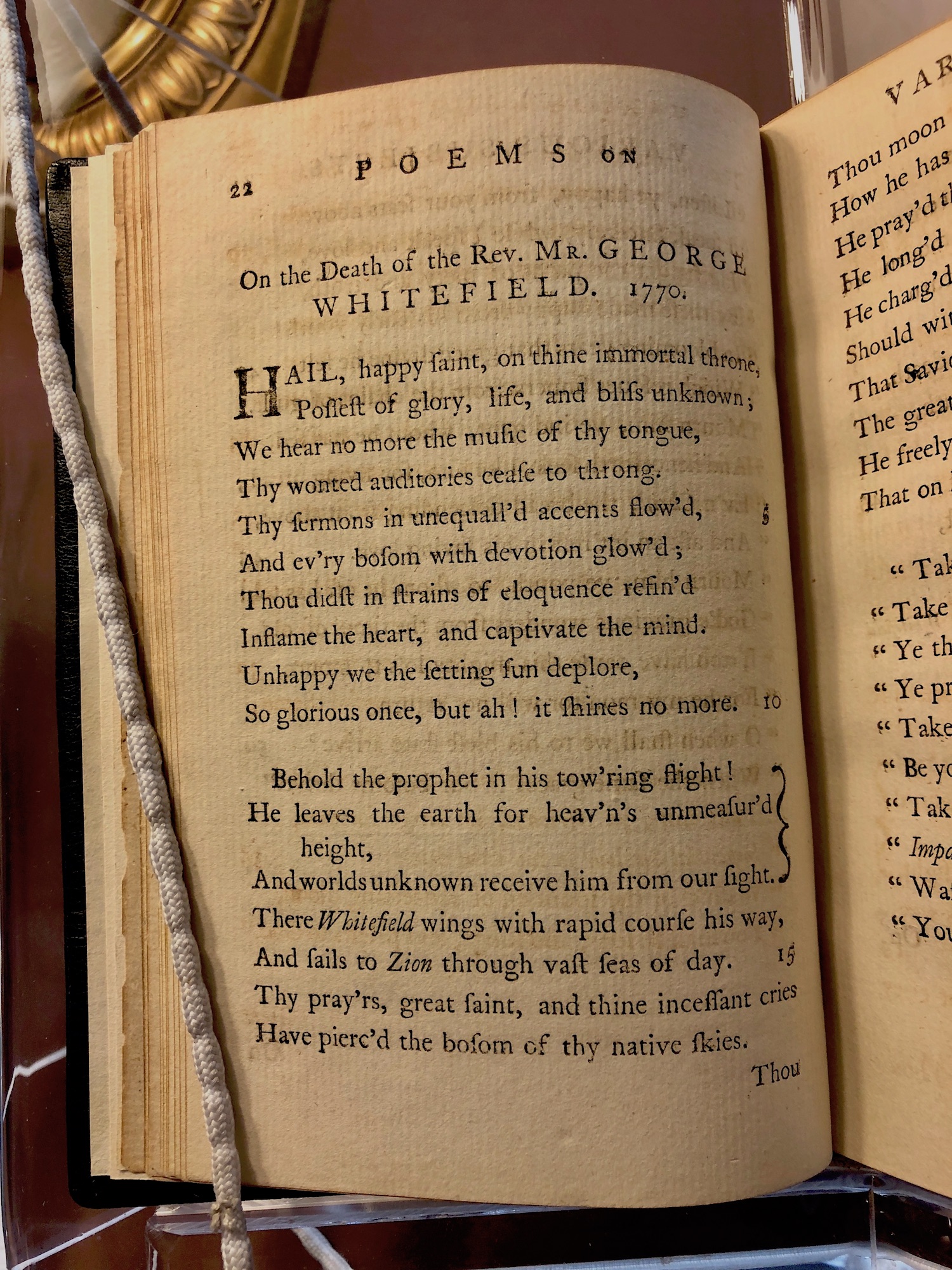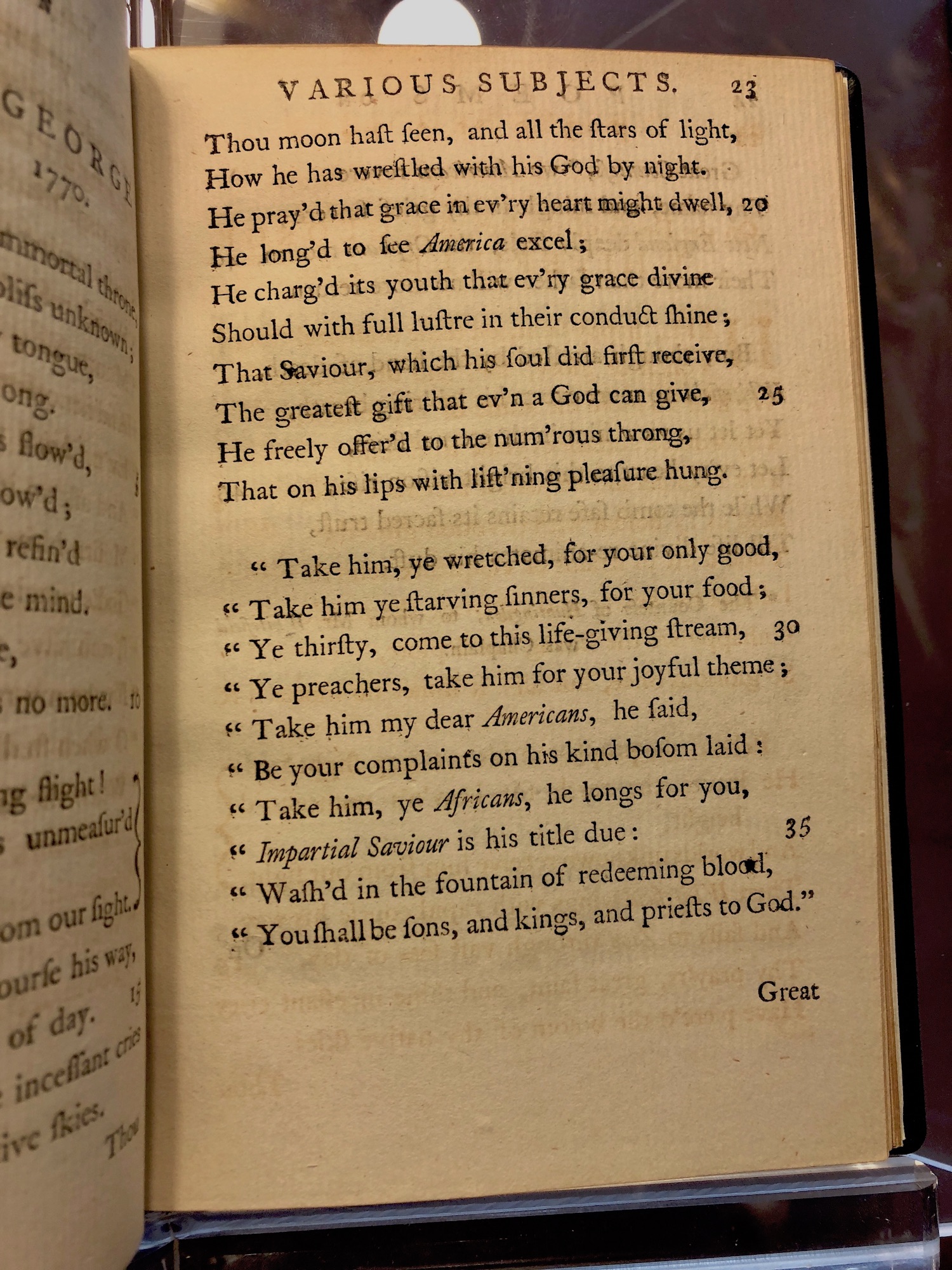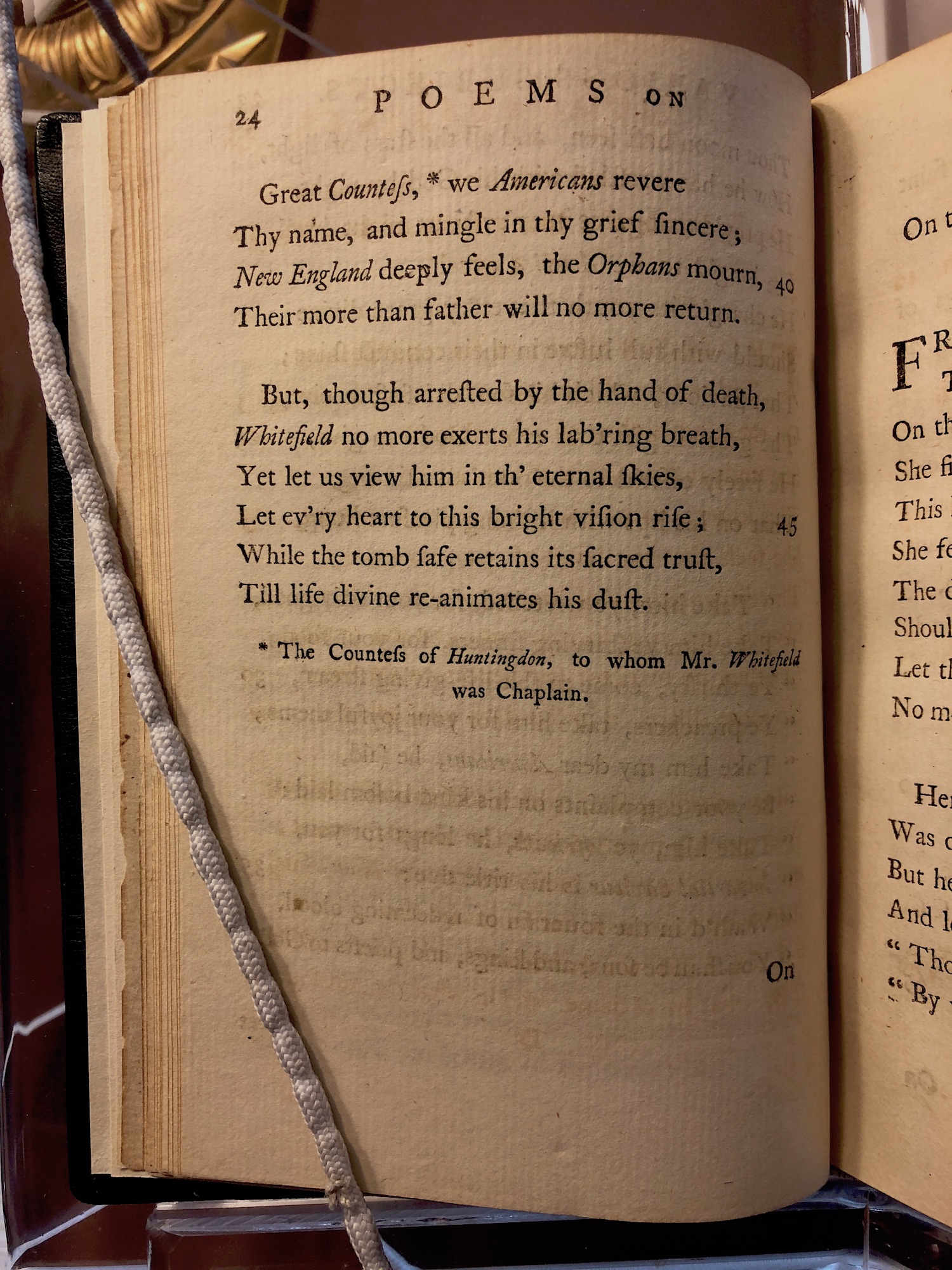"On the Death of the Rev. MR. GEORGE WHITEFIELD"
By
Phillis Wheatley
Transcription, correction, editorial commentary, and markup by Students of Marymount University, James West, Amy Ridderhof
22
On the Death of the Rev. MR. GEORGE WHITEFIELD.Whitefield
1770.
1HAIL, happy saint, on thine immortal throne,
2Possest of glory, life, and bliss unknown;
3We hear no more the music of thy tongue,
4Thy wonted auditorieswonted cease to throng.
5Thy sermons in unequall'd accentsunequalled flow'd,
6And ev'ry bosom with devotion glow'd;
7Thou didst in strains of eloquence refin'd
8Inflame the heart, and captivate the mind.
9Unhappy we the setting sun deplore,
10So glorious once, but ah! it shines no more.
11Behold the prophet in his tow'ring flight!
12He leaves the earth for heav'n's unmeasur'd height,
13And worlds unknown receive him from our sight.
14There Whitefield wings with rapid course his
way,
15And sails to ZionZion through vast seas of day.
16Thy pray'rs, great saint, and thine incessant cries
17Have pierc'd the bosom of thy native skies.
23
18Thou moon hast seen, and all the stars of light,
19How he has wrestled with his God by night.
20He pray'd that grace in ev'ry heart might dwell,
21He long'd to see America excel;
22He charg'd its youth that ev'ry grace divine
23Should with full lustre in their conduct shine;
24That Saviour, which his soul did first receive,
25The greatest gift that ev'n a God can give,
26He freely offer'd to the num'rous throng,
27That on his lips with list'ning pleasure hung.
28"Take him, ye wretched, for your only good,
29"Take him ye starving sinners, for your food;
30"Ye thirsty, come to this life-giving stream,
31"Ye preachers, take him for your joyful theme;
32"Take him my dear Americans, he said,
33"Be your complaints on his kind bosom laid:
34"Take him, ye Africans, he longs for you,
35"Impartial Saviour is his title due:
36"Wash'd in the fountain of redeeming blood,
37"You shall be sons, and kings, and priests to God."
24
38Great Countesscountess,
we Americans revere
39Thy name, and mingle in thy grief sincere;
40New England deeply feels, the Orphansorphans mourn,
41Their more than father will no more return.
42But, though arrested by the hand of death,
43Whitefield no more exerts his lab'ring
breath,
44Yet let us view him in th' eternal skies,
45Let ev'ry heart to this bright vision rise;
46While the tomb safe retains its sacred trust,
47Till life divine re-animates his dust.
Whitefield
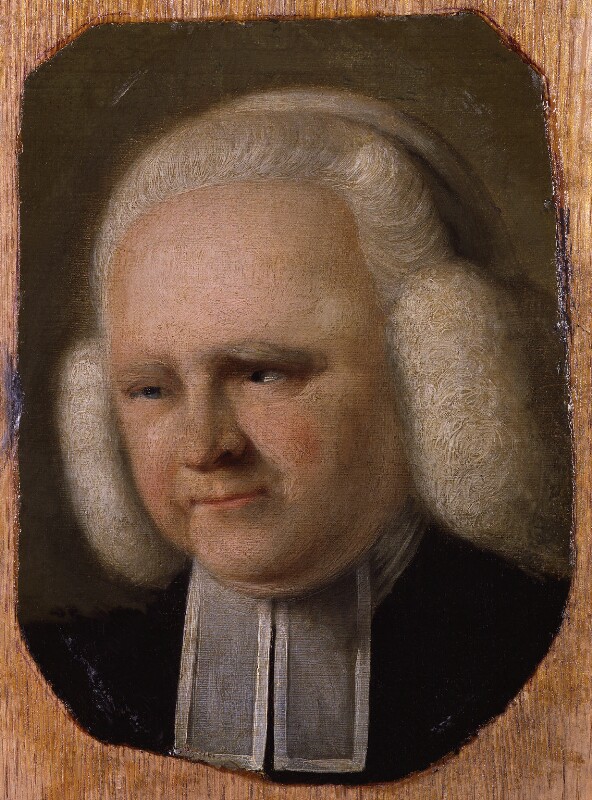 Source: Portrait of George Whitefield
George Whitefield (1714-1770; pronounced "wit-field") was one of the most famous people of the eighteenth-century Anglophone world. As a student at Oxford in the early 1730s, he got to know John and Charles Wesley, the founders of the Methodist movement in the church of England. Whitefield joined them in attempting to "methodize" the faith, returning it to the simple principles of the early church. But more than the Wesley brothers, Whitefield made this reformist movement into a public ministry. A famously charismatic public speaker, Whitefield preached to crowds numbering in the thousands in England and the American colonies, becoming a central figure in what was known as the "Great Awakening," a revival of evangelical Protestantism that was influential on both sides of the Atlantic. Benjamin Franklin and Olaudah Equiano were each impressed (though in very different ways) when they saw Whitefield preach in Philadelphia and Savannah, respectively. Whitefield made several visits to the Boston area, and it seems likely that the Wheatleys saw him preach there. Phillis might very well have joined them, but we cannot be sure. Whitefield died unexpectedly in Newburyport, Massachusetts on September 30, 1770, a few days after he left Boston on what turned out to be his last tour of the colonies.
Phillis Wheatley's elegy for Whitefield changed her life, transforming her from a young enslaved woman with a small readership among friends of the Wheatley family to an author with an international readership. The poem was published as a broadside on October 11, 1770, and was an immediate success. It was reprinted several times in colonial cities, as well as London, and also appeared in several newspapers. The poem brought Wheatley to the attention of Selina, the Countess of Huntingdon, who is addressed in the poem itself. A fervent Methodist herself, the Countess was Whitefield's patron, supporting him on his evangelical missions. The Countess became Wheatley's patron as well, sponsoring the publication of her only volume of poems, published in London in 1773.
[George Whitefield by an unknown artist, about 1770, National Portrait Gallery, London] - [JOB]
wontedwonted: "Accustomed, customary, usual." Oxford English Dictionary; auditory: "An assembly of hearers, an audience." Oxford English Dictionary, hence the meaning here is something like "usual audience." - [JOB]
unequalled"unequalled accents"; Whitefield was a famously eloquent and compelling public speaker; the sense here is that no other speaker could match the "accent" or style of his voice. - [JOB]
ZionZion is a name in the Hebrew bible for Jerusalem, and the term has often been extended to mean the entirety of what believers think of as the holy land, or even the afterlife. - [JOB]
countess
Source: Portrait of George Whitefield
George Whitefield (1714-1770; pronounced "wit-field") was one of the most famous people of the eighteenth-century Anglophone world. As a student at Oxford in the early 1730s, he got to know John and Charles Wesley, the founders of the Methodist movement in the church of England. Whitefield joined them in attempting to "methodize" the faith, returning it to the simple principles of the early church. But more than the Wesley brothers, Whitefield made this reformist movement into a public ministry. A famously charismatic public speaker, Whitefield preached to crowds numbering in the thousands in England and the American colonies, becoming a central figure in what was known as the "Great Awakening," a revival of evangelical Protestantism that was influential on both sides of the Atlantic. Benjamin Franklin and Olaudah Equiano were each impressed (though in very different ways) when they saw Whitefield preach in Philadelphia and Savannah, respectively. Whitefield made several visits to the Boston area, and it seems likely that the Wheatleys saw him preach there. Phillis might very well have joined them, but we cannot be sure. Whitefield died unexpectedly in Newburyport, Massachusetts on September 30, 1770, a few days after he left Boston on what turned out to be his last tour of the colonies.
Phillis Wheatley's elegy for Whitefield changed her life, transforming her from a young enslaved woman with a small readership among friends of the Wheatley family to an author with an international readership. The poem was published as a broadside on October 11, 1770, and was an immediate success. It was reprinted several times in colonial cities, as well as London, and also appeared in several newspapers. The poem brought Wheatley to the attention of Selina, the Countess of Huntingdon, who is addressed in the poem itself. A fervent Methodist herself, the Countess was Whitefield's patron, supporting him on his evangelical missions. The Countess became Wheatley's patron as well, sponsoring the publication of her only volume of poems, published in London in 1773.
[George Whitefield by an unknown artist, about 1770, National Portrait Gallery, London] - [JOB]
wontedwonted: "Accustomed, customary, usual." Oxford English Dictionary; auditory: "An assembly of hearers, an audience." Oxford English Dictionary, hence the meaning here is something like "usual audience." - [JOB]
unequalled"unequalled accents"; Whitefield was a famously eloquent and compelling public speaker; the sense here is that no other speaker could match the "accent" or style of his voice. - [JOB]
ZionZion is a name in the Hebrew bible for Jerusalem, and the term has often been extended to mean the entirety of what believers think of as the holy land, or even the afterlife. - [JOB]
countess 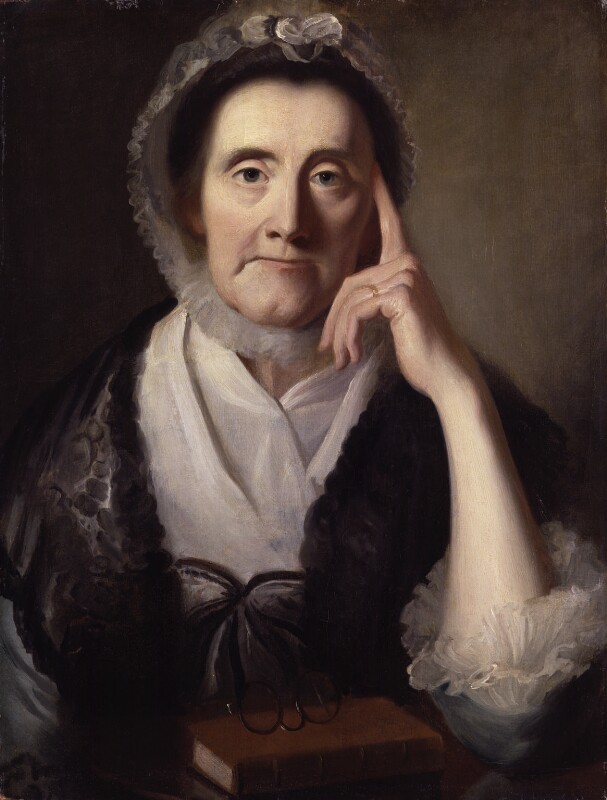 Source: Portrait of the Countess of HuntingtonThe Countess of Huntingdon, to whom Mr. Whitefield was Chaplain. [Wheatley's note]. Selina Hastings, the countess of Huntingdon (1707-1791), was a major figure in the Methodist movement, using her wealth to support the founding of chapels and a training school for ministers. Whitefield became her personal chaplain in the 1740s. Wheatley sought and recieved her patronage as well, and Wheatley's 1773 volume of poems was published with her support.
[Selina Hastings by an unknown artist, about 1770, National Portrait Gallery, London] - [JOB]
orphansWhitefield first came to the American colonies in 1738, when he travelled to Savannah, Georgia, where the colony's trustees had hired him to serve as minister. He decided to make his main project in Savannah the establishment of an orphanage, and he returned to England after only four months to raise money for the project. The Bethesda Orphan House was founded in 1740, and Whitefield continued to raise money and to return for visits to the institution throughout his lifetime. - [JOB]
Source: Portrait of the Countess of HuntingtonThe Countess of Huntingdon, to whom Mr. Whitefield was Chaplain. [Wheatley's note]. Selina Hastings, the countess of Huntingdon (1707-1791), was a major figure in the Methodist movement, using her wealth to support the founding of chapels and a training school for ministers. Whitefield became her personal chaplain in the 1740s. Wheatley sought and recieved her patronage as well, and Wheatley's 1773 volume of poems was published with her support.
[Selina Hastings by an unknown artist, about 1770, National Portrait Gallery, London] - [JOB]
orphansWhitefield first came to the American colonies in 1738, when he travelled to Savannah, Georgia, where the colony's trustees had hired him to serve as minister. He decided to make his main project in Savannah the establishment of an orphanage, and he returned to England after only four months to raise money for the project. The Bethesda Orphan House was founded in 1740, and Whitefield continued to raise money and to return for visits to the institution throughout his lifetime. - [JOB]
 Source: Portrait of George Whitefield
George Whitefield (1714-1770; pronounced "wit-field") was one of the most famous people of the eighteenth-century Anglophone world. As a student at Oxford in the early 1730s, he got to know John and Charles Wesley, the founders of the Methodist movement in the church of England. Whitefield joined them in attempting to "methodize" the faith, returning it to the simple principles of the early church. But more than the Wesley brothers, Whitefield made this reformist movement into a public ministry. A famously charismatic public speaker, Whitefield preached to crowds numbering in the thousands in England and the American colonies, becoming a central figure in what was known as the "Great Awakening," a revival of evangelical Protestantism that was influential on both sides of the Atlantic. Benjamin Franklin and Olaudah Equiano were each impressed (though in very different ways) when they saw Whitefield preach in Philadelphia and Savannah, respectively. Whitefield made several visits to the Boston area, and it seems likely that the Wheatleys saw him preach there. Phillis might very well have joined them, but we cannot be sure. Whitefield died unexpectedly in Newburyport, Massachusetts on September 30, 1770, a few days after he left Boston on what turned out to be his last tour of the colonies.
Phillis Wheatley's elegy for Whitefield changed her life, transforming her from a young enslaved woman with a small readership among friends of the Wheatley family to an author with an international readership. The poem was published as a broadside on October 11, 1770, and was an immediate success. It was reprinted several times in colonial cities, as well as London, and also appeared in several newspapers. The poem brought Wheatley to the attention of Selina, the Countess of Huntingdon, who is addressed in the poem itself. A fervent Methodist herself, the Countess was Whitefield's patron, supporting him on his evangelical missions. The Countess became Wheatley's patron as well, sponsoring the publication of her only volume of poems, published in London in 1773.
[George Whitefield by an unknown artist, about 1770, National Portrait Gallery, London] - [JOB]
wontedwonted: "Accustomed, customary, usual." Oxford English Dictionary; auditory: "An assembly of hearers, an audience." Oxford English Dictionary, hence the meaning here is something like "usual audience." - [JOB]
unequalled"unequalled accents"; Whitefield was a famously eloquent and compelling public speaker; the sense here is that no other speaker could match the "accent" or style of his voice. - [JOB]
ZionZion is a name in the Hebrew bible for Jerusalem, and the term has often been extended to mean the entirety of what believers think of as the holy land, or even the afterlife. - [JOB]
countess
Source: Portrait of George Whitefield
George Whitefield (1714-1770; pronounced "wit-field") was one of the most famous people of the eighteenth-century Anglophone world. As a student at Oxford in the early 1730s, he got to know John and Charles Wesley, the founders of the Methodist movement in the church of England. Whitefield joined them in attempting to "methodize" the faith, returning it to the simple principles of the early church. But more than the Wesley brothers, Whitefield made this reformist movement into a public ministry. A famously charismatic public speaker, Whitefield preached to crowds numbering in the thousands in England and the American colonies, becoming a central figure in what was known as the "Great Awakening," a revival of evangelical Protestantism that was influential on both sides of the Atlantic. Benjamin Franklin and Olaudah Equiano were each impressed (though in very different ways) when they saw Whitefield preach in Philadelphia and Savannah, respectively. Whitefield made several visits to the Boston area, and it seems likely that the Wheatleys saw him preach there. Phillis might very well have joined them, but we cannot be sure. Whitefield died unexpectedly in Newburyport, Massachusetts on September 30, 1770, a few days after he left Boston on what turned out to be his last tour of the colonies.
Phillis Wheatley's elegy for Whitefield changed her life, transforming her from a young enslaved woman with a small readership among friends of the Wheatley family to an author with an international readership. The poem was published as a broadside on October 11, 1770, and was an immediate success. It was reprinted several times in colonial cities, as well as London, and also appeared in several newspapers. The poem brought Wheatley to the attention of Selina, the Countess of Huntingdon, who is addressed in the poem itself. A fervent Methodist herself, the Countess was Whitefield's patron, supporting him on his evangelical missions. The Countess became Wheatley's patron as well, sponsoring the publication of her only volume of poems, published in London in 1773.
[George Whitefield by an unknown artist, about 1770, National Portrait Gallery, London] - [JOB]
wontedwonted: "Accustomed, customary, usual." Oxford English Dictionary; auditory: "An assembly of hearers, an audience." Oxford English Dictionary, hence the meaning here is something like "usual audience." - [JOB]
unequalled"unequalled accents"; Whitefield was a famously eloquent and compelling public speaker; the sense here is that no other speaker could match the "accent" or style of his voice. - [JOB]
ZionZion is a name in the Hebrew bible for Jerusalem, and the term has often been extended to mean the entirety of what believers think of as the holy land, or even the afterlife. - [JOB]
countess  Source: Portrait of the Countess of HuntingtonThe Countess of Huntingdon, to whom Mr. Whitefield was Chaplain. [Wheatley's note]. Selina Hastings, the countess of Huntingdon (1707-1791), was a major figure in the Methodist movement, using her wealth to support the founding of chapels and a training school for ministers. Whitefield became her personal chaplain in the 1740s. Wheatley sought and recieved her patronage as well, and Wheatley's 1773 volume of poems was published with her support.
[Selina Hastings by an unknown artist, about 1770, National Portrait Gallery, London] - [JOB]
orphansWhitefield first came to the American colonies in 1738, when he travelled to Savannah, Georgia, where the colony's trustees had hired him to serve as minister. He decided to make his main project in Savannah the establishment of an orphanage, and he returned to England after only four months to raise money for the project. The Bethesda Orphan House was founded in 1740, and Whitefield continued to raise money and to return for visits to the institution throughout his lifetime. - [JOB]
Source: Portrait of the Countess of HuntingtonThe Countess of Huntingdon, to whom Mr. Whitefield was Chaplain. [Wheatley's note]. Selina Hastings, the countess of Huntingdon (1707-1791), was a major figure in the Methodist movement, using her wealth to support the founding of chapels and a training school for ministers. Whitefield became her personal chaplain in the 1740s. Wheatley sought and recieved her patronage as well, and Wheatley's 1773 volume of poems was published with her support.
[Selina Hastings by an unknown artist, about 1770, National Portrait Gallery, London] - [JOB]
orphansWhitefield first came to the American colonies in 1738, when he travelled to Savannah, Georgia, where the colony's trustees had hired him to serve as minister. He decided to make his main project in Savannah the establishment of an orphanage, and he returned to England after only four months to raise money for the project. The Bethesda Orphan House was founded in 1740, and Whitefield continued to raise money and to return for visits to the institution throughout his lifetime. - [JOB]
Footnotes
_Whitefield
 Source: Portrait of George Whitefield
George Whitefield (1714-1770; pronounced "wit-field") was one of the most famous people of the eighteenth-century Anglophone world. As a student at Oxford in the early 1730s, he got to know John and Charles Wesley, the founders of the Methodist movement in the church of England. Whitefield joined them in attempting to "methodize" the faith, returning it to the simple principles of the early church. But more than the Wesley brothers, Whitefield made this reformist movement into a public ministry. A famously charismatic public speaker, Whitefield preached to crowds numbering in the thousands in England and the American colonies, becoming a central figure in what was known as the "Great Awakening," a revival of evangelical Protestantism that was influential on both sides of the Atlantic. Benjamin Franklin and Olaudah Equiano were each impressed (though in very different ways) when they saw Whitefield preach in Philadelphia and Savannah, respectively. Whitefield made several visits to the Boston area, and it seems likely that the Wheatleys saw him preach there. Phillis might very well have joined them, but we cannot be sure. Whitefield died unexpectedly in Newburyport, Massachusetts on September 30, 1770, a few days after he left Boston on what turned out to be his last tour of the colonies.
Phillis Wheatley's elegy for Whitefield changed her life, transforming her from a young enslaved woman with a small readership among friends of the Wheatley family to an author with an international readership. The poem was published as a broadside on October 11, 1770, and was an immediate success. It was reprinted several times in colonial cities, as well as London, and also appeared in several newspapers. The poem brought Wheatley to the attention of Selina, the Countess of Huntingdon, who is addressed in the poem itself. A fervent Methodist herself, the Countess was Whitefield's patron, supporting him on his evangelical missions. The Countess became Wheatley's patron as well, sponsoring the publication of her only volume of poems, published in London in 1773.
[George Whitefield by an unknown artist, about 1770, National Portrait Gallery, London]
Source: Portrait of George Whitefield
George Whitefield (1714-1770; pronounced "wit-field") was one of the most famous people of the eighteenth-century Anglophone world. As a student at Oxford in the early 1730s, he got to know John and Charles Wesley, the founders of the Methodist movement in the church of England. Whitefield joined them in attempting to "methodize" the faith, returning it to the simple principles of the early church. But more than the Wesley brothers, Whitefield made this reformist movement into a public ministry. A famously charismatic public speaker, Whitefield preached to crowds numbering in the thousands in England and the American colonies, becoming a central figure in what was known as the "Great Awakening," a revival of evangelical Protestantism that was influential on both sides of the Atlantic. Benjamin Franklin and Olaudah Equiano were each impressed (though in very different ways) when they saw Whitefield preach in Philadelphia and Savannah, respectively. Whitefield made several visits to the Boston area, and it seems likely that the Wheatleys saw him preach there. Phillis might very well have joined them, but we cannot be sure. Whitefield died unexpectedly in Newburyport, Massachusetts on September 30, 1770, a few days after he left Boston on what turned out to be his last tour of the colonies.
Phillis Wheatley's elegy for Whitefield changed her life, transforming her from a young enslaved woman with a small readership among friends of the Wheatley family to an author with an international readership. The poem was published as a broadside on October 11, 1770, and was an immediate success. It was reprinted several times in colonial cities, as well as London, and also appeared in several newspapers. The poem brought Wheatley to the attention of Selina, the Countess of Huntingdon, who is addressed in the poem itself. A fervent Methodist herself, the Countess was Whitefield's patron, supporting him on his evangelical missions. The Countess became Wheatley's patron as well, sponsoring the publication of her only volume of poems, published in London in 1773.
[George Whitefield by an unknown artist, about 1770, National Portrait Gallery, London]
 Source: Portrait of George Whitefield
George Whitefield (1714-1770; pronounced "wit-field") was one of the most famous people of the eighteenth-century Anglophone world. As a student at Oxford in the early 1730s, he got to know John and Charles Wesley, the founders of the Methodist movement in the church of England. Whitefield joined them in attempting to "methodize" the faith, returning it to the simple principles of the early church. But more than the Wesley brothers, Whitefield made this reformist movement into a public ministry. A famously charismatic public speaker, Whitefield preached to crowds numbering in the thousands in England and the American colonies, becoming a central figure in what was known as the "Great Awakening," a revival of evangelical Protestantism that was influential on both sides of the Atlantic. Benjamin Franklin and Olaudah Equiano were each impressed (though in very different ways) when they saw Whitefield preach in Philadelphia and Savannah, respectively. Whitefield made several visits to the Boston area, and it seems likely that the Wheatleys saw him preach there. Phillis might very well have joined them, but we cannot be sure. Whitefield died unexpectedly in Newburyport, Massachusetts on September 30, 1770, a few days after he left Boston on what turned out to be his last tour of the colonies.
Phillis Wheatley's elegy for Whitefield changed her life, transforming her from a young enslaved woman with a small readership among friends of the Wheatley family to an author with an international readership. The poem was published as a broadside on October 11, 1770, and was an immediate success. It was reprinted several times in colonial cities, as well as London, and also appeared in several newspapers. The poem brought Wheatley to the attention of Selina, the Countess of Huntingdon, who is addressed in the poem itself. A fervent Methodist herself, the Countess was Whitefield's patron, supporting him on his evangelical missions. The Countess became Wheatley's patron as well, sponsoring the publication of her only volume of poems, published in London in 1773.
[George Whitefield by an unknown artist, about 1770, National Portrait Gallery, London]
Source: Portrait of George Whitefield
George Whitefield (1714-1770; pronounced "wit-field") was one of the most famous people of the eighteenth-century Anglophone world. As a student at Oxford in the early 1730s, he got to know John and Charles Wesley, the founders of the Methodist movement in the church of England. Whitefield joined them in attempting to "methodize" the faith, returning it to the simple principles of the early church. But more than the Wesley brothers, Whitefield made this reformist movement into a public ministry. A famously charismatic public speaker, Whitefield preached to crowds numbering in the thousands in England and the American colonies, becoming a central figure in what was known as the "Great Awakening," a revival of evangelical Protestantism that was influential on both sides of the Atlantic. Benjamin Franklin and Olaudah Equiano were each impressed (though in very different ways) when they saw Whitefield preach in Philadelphia and Savannah, respectively. Whitefield made several visits to the Boston area, and it seems likely that the Wheatleys saw him preach there. Phillis might very well have joined them, but we cannot be sure. Whitefield died unexpectedly in Newburyport, Massachusetts on September 30, 1770, a few days after he left Boston on what turned out to be his last tour of the colonies.
Phillis Wheatley's elegy for Whitefield changed her life, transforming her from a young enslaved woman with a small readership among friends of the Wheatley family to an author with an international readership. The poem was published as a broadside on October 11, 1770, and was an immediate success. It was reprinted several times in colonial cities, as well as London, and also appeared in several newspapers. The poem brought Wheatley to the attention of Selina, the Countess of Huntingdon, who is addressed in the poem itself. A fervent Methodist herself, the Countess was Whitefield's patron, supporting him on his evangelical missions. The Countess became Wheatley's patron as well, sponsoring the publication of her only volume of poems, published in London in 1773.
[George Whitefield by an unknown artist, about 1770, National Portrait Gallery, London]_wontedwonted: "Accustomed, customary, usual." Oxford English Dictionary; auditory: "An assembly of hearers, an audience." Oxford English Dictionary, hence the meaning here is something like "usual audience."
_unequalled"unequalled accents"; Whitefield was a famously eloquent and compelling public speaker; the sense here is that no other speaker could match the "accent" or style of his voice.
_ZionZion is a name in the Hebrew bible for Jerusalem, and the term has often been extended to mean the entirety of what believers think of as the holy land, or even the afterlife.
_countess  Source: Portrait of the Countess of HuntingtonThe Countess of Huntingdon, to whom Mr. Whitefield was Chaplain. [Wheatley's note]. Selina Hastings, the countess of Huntingdon (1707-1791), was a major figure in the Methodist movement, using her wealth to support the founding of chapels and a training school for ministers. Whitefield became her personal chaplain in the 1740s. Wheatley sought and recieved her patronage as well, and Wheatley's 1773 volume of poems was published with her support.
[Selina Hastings by an unknown artist, about 1770, National Portrait Gallery, London]
Source: Portrait of the Countess of HuntingtonThe Countess of Huntingdon, to whom Mr. Whitefield was Chaplain. [Wheatley's note]. Selina Hastings, the countess of Huntingdon (1707-1791), was a major figure in the Methodist movement, using her wealth to support the founding of chapels and a training school for ministers. Whitefield became her personal chaplain in the 1740s. Wheatley sought and recieved her patronage as well, and Wheatley's 1773 volume of poems was published with her support.
[Selina Hastings by an unknown artist, about 1770, National Portrait Gallery, London]
 Source: Portrait of the Countess of HuntingtonThe Countess of Huntingdon, to whom Mr. Whitefield was Chaplain. [Wheatley's note]. Selina Hastings, the countess of Huntingdon (1707-1791), was a major figure in the Methodist movement, using her wealth to support the founding of chapels and a training school for ministers. Whitefield became her personal chaplain in the 1740s. Wheatley sought and recieved her patronage as well, and Wheatley's 1773 volume of poems was published with her support.
[Selina Hastings by an unknown artist, about 1770, National Portrait Gallery, London]
Source: Portrait of the Countess of HuntingtonThe Countess of Huntingdon, to whom Mr. Whitefield was Chaplain. [Wheatley's note]. Selina Hastings, the countess of Huntingdon (1707-1791), was a major figure in the Methodist movement, using her wealth to support the founding of chapels and a training school for ministers. Whitefield became her personal chaplain in the 1740s. Wheatley sought and recieved her patronage as well, and Wheatley's 1773 volume of poems was published with her support.
[Selina Hastings by an unknown artist, about 1770, National Portrait Gallery, London]_orphansWhitefield first came to the American colonies in 1738, when he travelled to Savannah, Georgia, where the colony's trustees had hired him to serve as minister. He decided to make his main project in Savannah the establishment of an orphanage, and he returned to England after only four months to raise money for the project. The Bethesda Orphan House was founded in 1740, and Whitefield continued to raise money and to return for visits to the institution throughout his lifetime.
